Focused on scientists early in their careers or education, University of Arizona Sarver Heart Center Investigator Award recipients for 2018-2019 include an undergraduate, graduate students and early-career faculty members who represent molecular science, psychology and cardiology, among others.
“The unflagging generosity of our donors ensures the ongoing success of the Sarver Heart Center Investigator Award Program. Gifts to this program come in many forms. We have received generous individual donations to support a research focus area. Highly coveted planned gifts provide investigator award funding not only now but into the future,” said Nancy K. Sweitzer, MD, PhD, director of the UA Sarver Heart Center and chief of cardiology. “This allows us to foster career development on our campuses with this program as a predictable resource.”
Sarver Heart Center Investigator Awards provide variable amounts of funding up to $25,000 and support innovative pilot projects that commonly lead to larger regional and national grants. The return on investment for this program has been as high as 10 to 1, said Dr. Sweitzer.
Women of Color Research Award
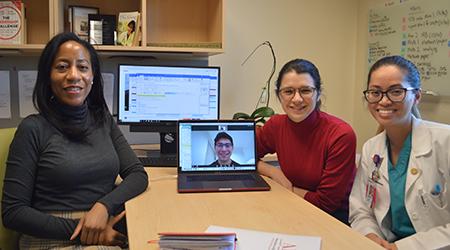
“Addressing Individual Provider Bias in Selection of Advanced Heart Failure Therapies in Racial/Ethnic Minorities”
Mentor: Nancy Sweitzer, MD, PhD
“Cardiovascular disease affects women and underrepresented minorities, and the disparities in care and outcomes have persisted with little improvement. As a clinician scientist, it is my priority to champion efforts to reduce cardiovascular disparities among women and racial/ethnic minorities, particularly in heart failure. To this end, I have conducted multiple studies to better understand disparities and identify process-of-care targets to reduce disparities. Over the next five to 10 years, I will continue my services research, the results of which, by providing practical tools to reduce disparities, will influence policy decisions, change clinical practice and improve quality of care,” said Dr. Breathett.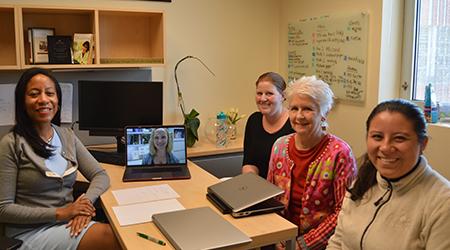
Understanding the role of bias in the selection of patients for advanced heart failure therapies is a critical step in creating health equity. The study funded by this award will examine individual provider bias and the group decision-making process for selecting patients for advanced therapies for heart failure, heart transplants and left ventricular assist devices. Dr. Breathett’s research team will identify the most important subjective eligibility criteria for advanced therapies and implement a standardized protocol that more objectively addresses these criteria.
Steven M. Gootter Foundation Award
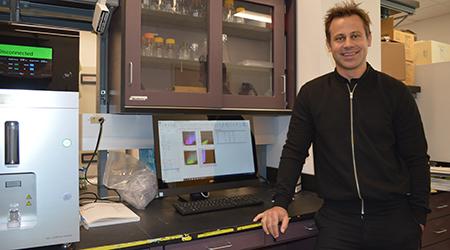
“Modelling Exercise Induced Stress with ACM Engineered Heart Tissues”
Mentor: Nancy Sweitzer, MD, PhD
“Cardiovascular disease is the number one killer in the world and stem cells provide important new clues to understand heart disease mechanisms," said Dr. Churko.
Arrhythmogenic cardiomyopathy (ACM), formerly known as arrhythmogenic right ventricular cardiomyopathy/dysplasia (ARVC/D), is an inherited heart disease in which the ventricular heart muscle tissue develops arrhythmias, resulting in higher rates of sudden cardiac death. While ACM generally is considered a genetic disease, exercise and other contributing non-genetic environmental factors are suspected to increase risks. However, researchers still do not understand completely the mechanisms leading to ACM. This research will generate induced pluripotent stem cells (iPSCs) from patients with ACM and further differentiate iPSC cells into cardiomyocytes (hiPSC-CMs) to understand ACM. Specifically, we are taking a transcriptomic approach to identify the molecular signaling pathways involved in ACM pathology. This approach will help explain how the genome produces specific cells under specific circumstances.
William J. “Billy” Gieszl Endowment for Heart Research
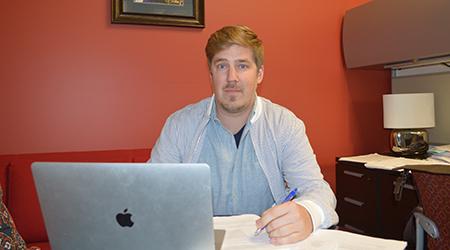
“Role of Nox4 in Duchene Muscular Dystrophy-related Dilated Cardiomyopathy”
Mentor: Henk Granzier, PhD
“Heart disease research allows me to apply my interests in physiology and biomedicine to the leading cause of death in the U.S. I became fascinated by the mechanical pumping function of cardiac cells that develop force, and how innovations in medical devices and new pharmaceuticals are used to better treat heart disease.”
Patients with Duchenne muscular dystrophy (DMD) suffer from progressive muscle weakness, including weakness of the heart muscle. Enlargement of the heart, and replacement of heart muscle cells by scarring, leads to heart failure, which is the leading cause of premature death in these patients who lack dystrophin, a large protein that connects muscle cell structures. Numerous studies have demonstrated that skeletal and cardiac muscle in DMD lab models exhibit high levels of oxidative stress. Review of a number of failed clinical trials testing antioxidants suggests these antioxidant strategies were not effective because they failed to precisely target the source of oxidant generation. To address these critical knowledge gaps, Dr. Colson will develop a proof-of-concept tool to evaluate the Nox4 gene as novel therapeutic target for DMD. Nox4 is a major source of oxidative stress in heart failure.
Finley and Florence Brown Award
Jessika Iwanski, MS (MD/PhD candidate)
“Examining the role of cyclase-associated protein 2 in cardiomyocyte thin filament function and contractility”
Mentor: Carol Gregorio, PhD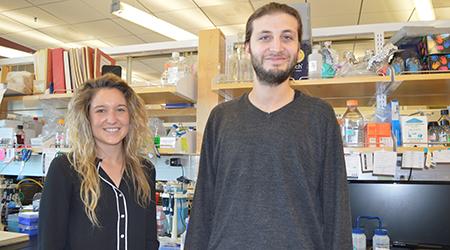
“After joining the UA graduate perfusion sciences program, I fell in love with cardiology, heart devices and transplants. Working alongside cardiothoracic and transplant surgeons, I was inspired to pursue a career in academic medicine, focusing on adult cardiac care and researching the mechanisms behind the development of heart disease.”
A cardiomyopathy is a disease of the heart muscle which can lead to a reduction in pumping function. Previous research in the lab has been instrumental in describing the role that controlling thin filament length plays in cardiomyopathy. Thin filaments are one of two interacting protein strands in heart muscle that are required for contraction. In this study, Jessika Iwanski and Mert Colpan, PhD, co-principal investigator, will decipher the molecular role of CAP2, a novel actin regulatory protein, and how it contributes to thin filament length regulation and cardiac disease.
Novel Cardiovascular Research Awards
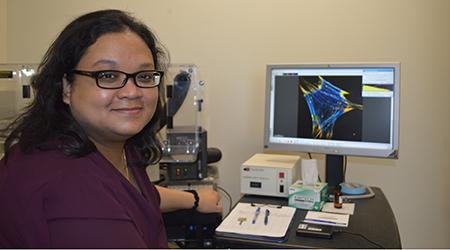
“Leiomodin-2 regulates cardiac thin filament length and function”
Mentor: Carol Gregorio, PhD
"My goals are to contribute towards the advancement of basic cardiovascular science research, and to make an impact on the direction of therapeutic discoveries for cardiac myopathies.”
As muscles contract, the force they generate depends on the degree of overlap between actin-based thin and myosin-based thick filaments (the threadlike fibers that make up heart-muscle cells). Maintaining precise lengths of these filaments is critical to normal heart function. The long-term goal of Dr. Mi-Mi’s work is to understand how thin filament length is regulated in heart muscle and how altered thin filament lengths lead to cardiomyopathy (disease of muscle tissue).
Stefanie Mares Novak, PhD
“Elucidating the role of the RNA binding protein, FXR1, in Duchenne Muscular Dystrophy”
Mentor: Carol Gregorio, PhD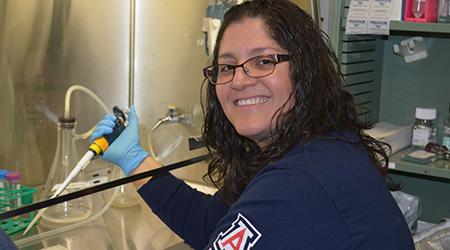
"I started my career as a scientific researcher in Dr. Darrel Goll’s laboratory in the Department of Nutritional Science here at the UA. After losing my mentor, Dr. Goll, to a heart attack in 2008, I decided to earn my PhD in cellular and molecular medicine so I can pursue a career in heart disease research."
This project will increase understanding of the function of a member of the RNA-binding Fragile X family of proteins, FXR1, in heart disease that is prevalent later in life in Duchenne Muscular Dystrophy patients. This project will lead to important insights into RNA-based mechanisms for cardiac function, and may help identify therapeutic approaches for heart conditions linked to defects in FXR1 or its RNA targets.
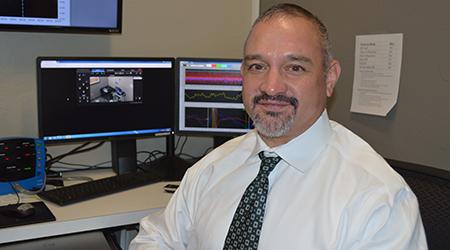
Associate Professor, UA Department of Psychology
“Hispanic Ethnicity and Southern Border Proximity as a Moderators of Cardiovascular Risk and Resilience: Ethnicity, Stress, and The Relational Environment Study (ESTRES)”
“I was a masters student at University of Colorado when the Oklahoma City bombing occurred. Within 24 hours of the act, we were on the ground collecting data. My first publication documented variations in stress biomarker concentrations as a function of proximity and emotional reactions among survivors. The evidence we gathered demonstrated that the body "keeps score" of psychological events. This hooked me and led to a career as a scientist studying the impact stress on cardiovascular disease."
Psychological stress increasingly is recognized as a significant contributor to cardiovascular disease risk and outcomes. Despite high stress exposure, emerging evidence suggests Hispanics may perceive relatively less stress than other groups. This may contribute to an observed Hispanic health paradox: Hispanic Americans have higher life expectancies, despite higher poverty rates, harsher jobs and less access to health care and education. At the same time, the ongoing immigration-related tension at the U.S.-Mexico border may represent a novel stress risk for those Hispanics residing in the border area. Findings will facilitate an NIH/R01 application to investigate effects of stress on atherosclerotic progression (buildup of plaque in the arteries) and potential mediation by family and social structure.
Margarito Chavez Awards
Samuel Shi, BS
Graduate student in the Clinical Translational Science Program, UA College of Medicine Phoenix
“Investigating the Expression Profile and Sex Differences of Sphingosine-1-Phosphate Receptor Subtype 1 in the Cerebrovasculature following Acute Ischemia and Reperfusion”
Mentor: Rayna J. Gonzales, PhD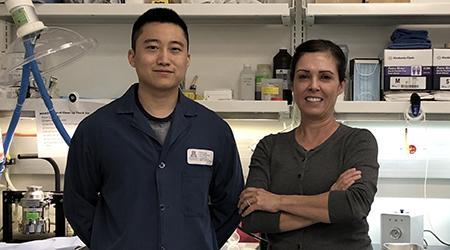
“I’m attracted to medical science because it is a discipline where you need to be constantly learning and growing as an investigator to remain competitive. I am pursuing a doctoral degree in neuroscience.”
Acute ischemic stroke, a devastating and common cerebrovascular disease, occurs when blood flow to the brain is blocked. Epidemiologic studies reveal clear sex differences in stroke prevalence, incidence and mortality. Sex differences may also influence response to treatment and subsequent clinical outcomes. Men have strokes at younger ages than women. The goal of Dr. Shi’s study uses an animal model of brain ischemia and resumed blood flow, or reperfusion (a model of stroke). Shi hypothesizes that ischemia and reperfusion injury alters expression of an important regulatory protein, S1PR1, in brain endothelial cells (the interior surface of blood vessels). Shi will characterize the expression profile of S1PR1 in an animal model and investigate if sex differences exist.
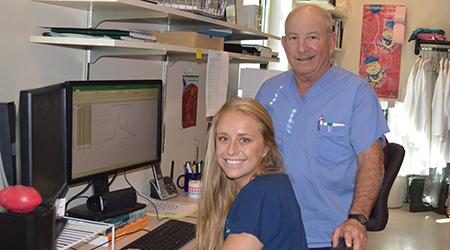
Undergraduate, Biomedical Engineering
“Quality of Life and Functional Capacity Study in Pre-MI and Post-MI”
Mentor: Steven Goldman, MD
“My brother has epilepsy and his condition motivated me to pursue biomedical research. I’m planning to study neural engineering. The work in the Goldman Lab gives me a strong understanding of how to conduct research and will help me reach the next step of my training.”
The research team is studying quality-of-life and functional capacity before and after a heart attack. Using a FitBit-like device adapted to the lab model and a portable ECG with special adhesives to record data for 10 minutes, the research team is evaluating exercise tolerance and daily activity levels to compare pre-heart-attack baseline data with post-heart-attack data.

